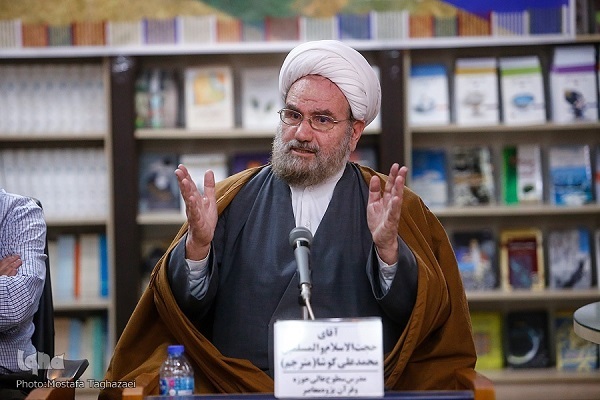AhlulBayt News Agency: Hojat-ol-Islam Mohammad Ali Kousha made the remark in a program held Wednesday at the Ittila’at Institute here in Tehran for discussing his new translation of the Quran into Persian.
He described the cultural development in the field of Quranic studies as one of main fruits of the revolution, adding that he himself managed to launch courses on Quran translation techniques at the Islamic Seminary of Qom thanks to this development.
Referring to his rendering of the Holy Book, Hojat-ol-Islam Kousha said it took him ten years to complete the work.
Then he spent two more years on reviewing and editing the translation with the help of Quran experts and scholars like Bahaeddin Khorramshahi, Nadali Ashouri and Mohammad Jokar.
Noting that he has studied Persian translations of the Quran released from the 11th century to the contemporary era, Hojat-ol-Islam Kousha said there is need for a new rendering of the Holy Book in every ten years at least.
Quranic and Islamic scholar Hojat-ol-Islam Mohammad Ali Khosravi was another speaker at the program who stressed in his address that the Quran is untranslatable.
He said the more eloquent and rich a text in the source language is, the more difficult it would be to translate it.
As the Holy Quran is at the peak of eloquence and richness, it is impossible to fully translate it into any language, he added.
It is more so because verses of the Quran have many layers of meanings and no translator is capable of conveying all of them, the scholar stated.
Therefore, translation of the Quran will never remove our need to read and contemplate it, he went on to say, noting that it nevertheless is a good way for learning it and getting closer to it.
/129
He described the cultural development in the field of Quranic studies as one of main fruits of the revolution, adding that he himself managed to launch courses on Quran translation techniques at the Islamic Seminary of Qom thanks to this development.
Referring to his rendering of the Holy Book, Hojat-ol-Islam Kousha said it took him ten years to complete the work.
Then he spent two more years on reviewing and editing the translation with the help of Quran experts and scholars like Bahaeddin Khorramshahi, Nadali Ashouri and Mohammad Jokar.
Noting that he has studied Persian translations of the Quran released from the 11th century to the contemporary era, Hojat-ol-Islam Kousha said there is need for a new rendering of the Holy Book in every ten years at least.
Quranic and Islamic scholar Hojat-ol-Islam Mohammad Ali Khosravi was another speaker at the program who stressed in his address that the Quran is untranslatable.
He said the more eloquent and rich a text in the source language is, the more difficult it would be to translate it.
As the Holy Quran is at the peak of eloquence and richness, it is impossible to fully translate it into any language, he added.
It is more so because verses of the Quran have many layers of meanings and no translator is capable of conveying all of them, the scholar stated.
Therefore, translation of the Quran will never remove our need to read and contemplate it, he went on to say, noting that it nevertheless is a good way for learning it and getting closer to it.
/129

